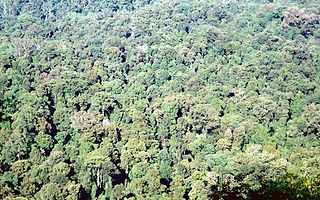
The Toonumbar National Park is a protected national park located in the Northern Rivers region of New South Wales, Australia. The 14,910-hectare (36,800-acre) park is situated approximately 620 kilometres (390 mi) north of Sydney, near the town of Woodenbong.

Ficus macrophylla, commonly known as the Moreton Bay fig or Australian banyan, is a large evergreen banyan tree of the Mulberry Family (Moraceae) native to eastern Australia, from the Wide Bay–Burnett region in the north to the Illawarra in New South Wales, as well as Lord Howe Island where the subspecies F. m. columnaris is a banyan form covering 2.5 acres or more of ground. Its common name is derived from Moreton Bay in Queensland, Australia. It is best known for its imposing buttress roots.

Argyrodendron is a genus of mainly trees in the family Malvaceae. They occur in Malesia, New Guinea and Australia. In Australia, they are a well-known rainforest species known by their Indigenous Australian name, booyong or the tulip oak.
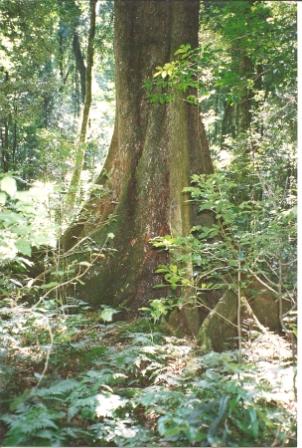
Argyrodendron actinophyllum is a large rainforest tree, native to eastern Australia. Common names include black booyong, blackjack, blush tulip oak, crowsfoot elm and Mackay tulip oak. The heartwood is coloured pink-brown. One of the most distinctive features of Argyrodendron actinophyllum is the large deep green leaves that radiate out from central stems – hence the specific epithet actino 'ray', phyllum 'leaf'. Also the trunks form large characteristic buttresses.
The Big Scrub was the largest area of lowland subtropical rainforest in eastern Australia. It was intensively cleared for agricultural use in the 19th century (1801–1900) by settlers. Less than 1% now remains.

Sloanea woollsii, commonly known as yellow carabeen, carribin, grey carrobean, or eslanea amarela in Portuguese, is a large tree species with plank buttresses that is native to northeastern NSW and eastern Queensland, Australia. Its southern distributional limit is near the town of Bulahdelah at Tallowwood Forest Park and O'Sullivans Gap Reserve.
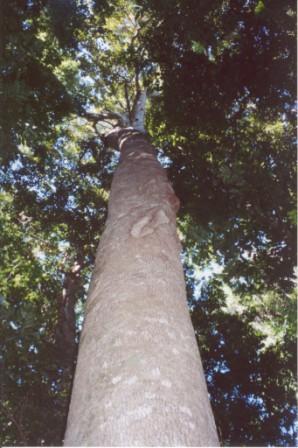
Gmelina leichhardtii, the white beech, is a tree of eastern Australia. Scattered individuals or small groups of trees naturally occur from the Illawarra district of New South Wales to near Proserpine in tropical Queensland. The white beech or grey teak is a fast-growing tree, growing on volcanic and alluvial soils in areas of moderate to high rainfall. It also grows on poorer sedimentary soils in fire free areas. White beech may occasionally be seen in Australian rainforests, though their status is considered "uncommon". Unlike the Australian red cedar, the white beech has not recovered particularly well after logging in the 19th and 20th centuries.
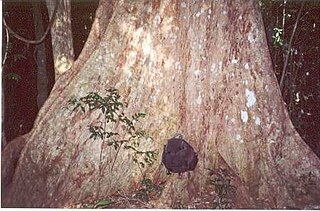
Syzygium francisii is a native Australian tree, common on the eastern sea board, between Morisset, New South Wales and Gladstone, Queensland. Common names include giant water gum, rose satinash, and Francis water gum. The habitat of Syzygium francisii is rainforest on basaltic or fertile alluvial soils.

Atractocarpus benthamianus is a species of flowering plant in the family Rubiaceae growing in eastern Australia. It is an understorey species of subtropical and tropical rainforest on fertile soils. The natural range of distribution is from Forster, New South Wales to central Queensland. This plant features beautifully scented flowers.

Numinbah Nature Reserve is a protected nature reserve that is located in the Northern Rivers region of New South Wales, in eastern Australia. The reserve was gazetted in December 1981 with a further addition made in 1989 to make the reserve to its current area of 858 hectares. The reserve is situated north-east of the rural locality of Numinbah, and south of the Queensland town of Springbrook and defines part of the state border between New South Wales and Queensland.

The Davis Scrub Nature Reserve is a protected nature reserve that is located in the Northern Rivers region of New South Wales, Australia. The 13-hectare (32-acre) reserve is a sub tropical rainforest remnant of the Big Scrub and is situated at 170 metres (560 ft) above sea level on an undulating high rainfall plain near Alstonville.

The Victoria Park Nature Reserve is a protected nature reserve that is located in the Northern Rivers region in the state of New South Wales, in eastern Australia. The sub-tropical jungle remnant is located an undulating high rainfall plain near Alstonville. The red-brown soil is derived from a basaltic flow from the nearby Mount Warning. Of the total land in the reserve, 8 hectares is original rainforest; and the other areas are being re-vegetated.

The Andrew Johnston Big Scrub Nature Reserve is a protected nature reserve in the Northern Rivers region of New South Wales, Australia. A subtropical jungle remnant of the Big Scrub, the 21-hectare (52-acre) reserve is approximately 19 kilometres (12 mi) northeast of Lismore. Far less than 1% of the original Big Scrub now remains.

The Booyong Flora Reserve is a protected nature reserve located in Booyong in the Northern Rivers region of New South Wales, Australia. The 13-hectare (32-acre) sub–tropical jungle is situated 18 kilometres (11 mi) northeast of Lismore and is a remnant of the Big Scrub, of which less than one percent of the original Big Scrub remains.
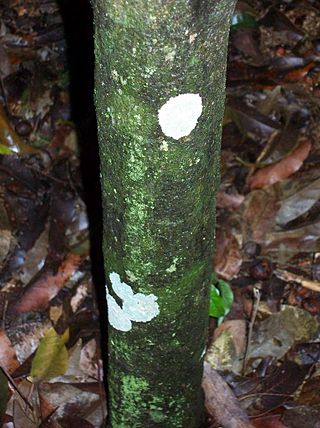
Ochrosia moorei, known as the southern ochrosia is a rainforest plant of eastern Australia. Endangered by extinction, it has a ROTAP rating of 2ECi.

Clerodendrum floribundum, known as the lolly bush or smooth clerodendrum, is a shrub or tree found in Australia and New Guinea. The habitat is in or at the margins of coastal rainforests, up to 300 metres above sea level. In Western Australia it grows in drier areas; such as rocky sites, gorges, cliffs, floodplains and creek beds.
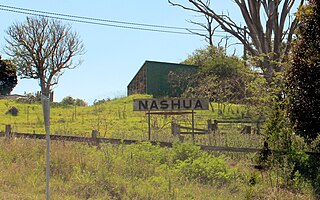
Nashua is a former railway station and locality in the north-east of New South Wales, between Lismore and Byron Bay.
Booyong is a common name for Argyrodendron, a genus of plants

Coramba Nature Reserve is a protected nature reserve located near Coffs Harbour in the Mid North Coast region of New South Wales, Australia. It is one of the few remnants of low altitude sub tropical rainforest in the Clarence River valley. Founded in 1982 with the primary goal of protecting the remaining lowland rainforests.
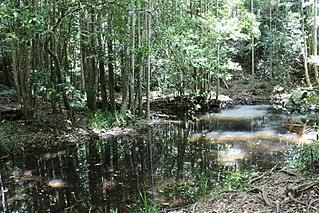
Sherwood Nature Reserve is a protected nature reserve located near Woolgoolga in the north coast region of New South Wales, Australia.























